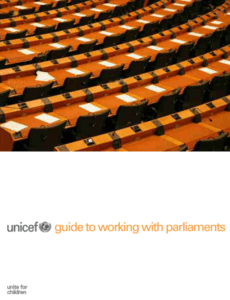 This guide serves as an introduction to parliamentary practice and provides examples of how UNICEF has successfully engaged parliaments to promote the rights of children. The guide also provides a list of resources for further information on parliamentary engagement as well as an appendix that includes a focus on parliamentary support for achieving Millennium Development Goals (MDGs) 4 and 5 and parliamentary engagement by UNICEF National Committees.
This guide serves as an introduction to parliamentary practice and provides examples of how UNICEF has successfully engaged parliaments to promote the rights of children. The guide also provides a list of resources for further information on parliamentary engagement as well as an appendix that includes a focus on parliamentary support for achieving Millennium Development Goals (MDGs) 4 and 5 and parliamentary engagement by UNICEF National Committees.
The guide is divided into three main sections. The first, “Introduction to Parliamentary Practice,” provides an overview of the four major parliamentary functions (law-making, oversight, budgeting and representation), and explains their relevance to UNICEF’s mandate. The second section, “Framework for Parliamentary Engagement,” outlines key challenges and strategies for engagement with parliaments. This section features guideposts for parliamentary engagement that include the importance of understanding legislative and political structures and contexts, the various potential entry points available to UNICEF staff, and suggestions for how UNICEF can leverage its comparative advantages— non-partisanship, technical and field expertise, and convening power.
The third section of this guide,“Key Resources,”provides further information on parliaments and their involvement with issues pertinent to children’s rights (e.g., juvenile justice, child marriage, HIV/AIDS). Included here are an annotated bibliography of useful publications, hyperlinks to the websites of national parliaments and key parliamentary actors, and an overview of UNICEF’s partnership with the Inter-Parliamentary Union and UNDP’s parliamentary development work.
The appendix contains information on child survival and maternal health — MDGs 4 and 5 — and provides recommendations and strategies for how UNICEF can help mobilize parliamentarians to address these issues with respect to each of the four major parliamentary functions noted above. It also includes a section on parliamentary engagement by UNICEF National Committees.
